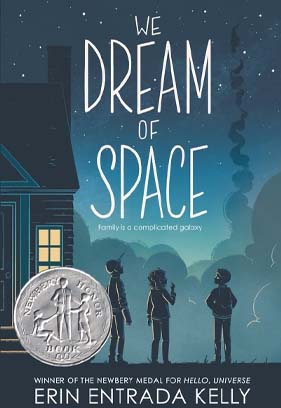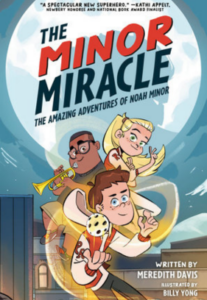Bird’s parents, Mike and Tam, are, quite frankly, pretty poor parents. They’re not terrible people: They love their kids and take time with them. But they’re so focused on their own immediate needs and the tensions that have grown between them as a couple, that they seem oblivious to the impact their constant bickering causes. The Nelson Thomas kids walk on egg shells around their parents and run to their rooms to escape the flare ups. Bird, who tends to be very analytical about the things in her life (even to the point of drawing schematics of machines for fun) describes her family like this:
“The Thomas family was like its own solar system. Planets in orbit. No, not planets. More like meteors or space junk. Floating objects that sometimes bumped or slammed into each other before breaking apart.”
That family dysfunction is used, though, as an object lesson to help point young readers to things they should avoid or others they should seek. In fact, when Bird is invited over to her friend Dani’s house, she marvels at its cleanliness and warmth. And she openly longs for the girl’s family’s connection, good humor and displays of affection—ultimately trying to instill of bit of that positive change back at home.
Her friend’s family is so appealing to Bird, she even goes to their house and uses a spare key to break into the empty home when she reaches a particularly low and depressed point in her life. That choice isn’t praised, but it further illustrates the healing appeal of even the symbols of family love and comforting acceptance. Dani’s parents are positive, accepting and warm.
Another positive adult in Bird’s life is her teacher Ms. Salonga. She actually applied to be the teacher who joined the Challenger crew but didn’t make the cut. She is an open and caring teacher who motivates Bird and other students to think inquisitively and carefully about the things of importance in their lives. And she leads them to make better choices, too. Ms. Salonga’s sincere, warm actions make Bird sometimes wish her teacher was her mom.
It should also be noted that some kids tease, make fun of and lightly bully others, speaking rudely or calling them names at times. (One boy calls a tall curly haired girl Chewbacca, for instance.) And Fitch slips into that choice when his anger gets the best of him, too. He screams angrily at an innocent young girl in class, for example, embarrassing and lightly traumatizing her in public. He reaps the punishment for such behavior. And later he beats himself up for his own foolish, heated words, and he reaches out to apologize.
Cash is generally depressed about his failures, including basketball and school. But eventually, through the encouragement of others—such as Bird and a school coach—he’s inspired to work toward a new positive goal in his life.











